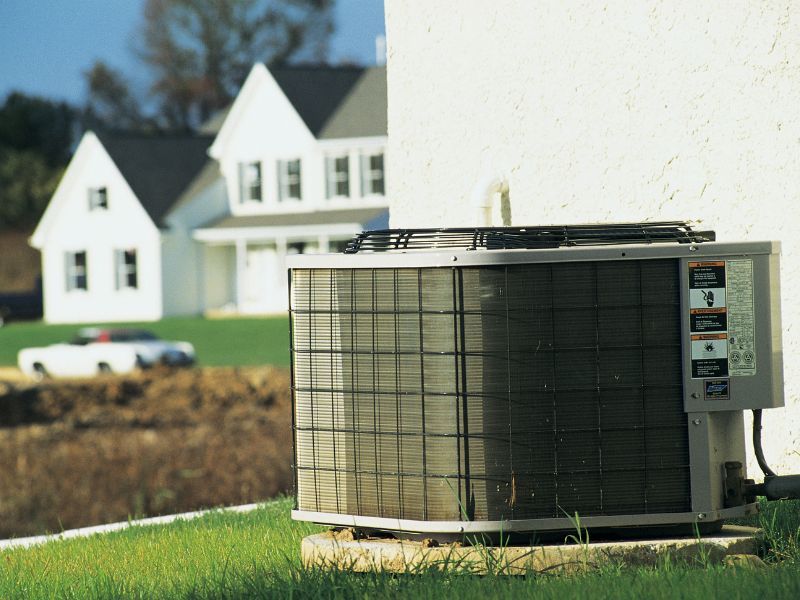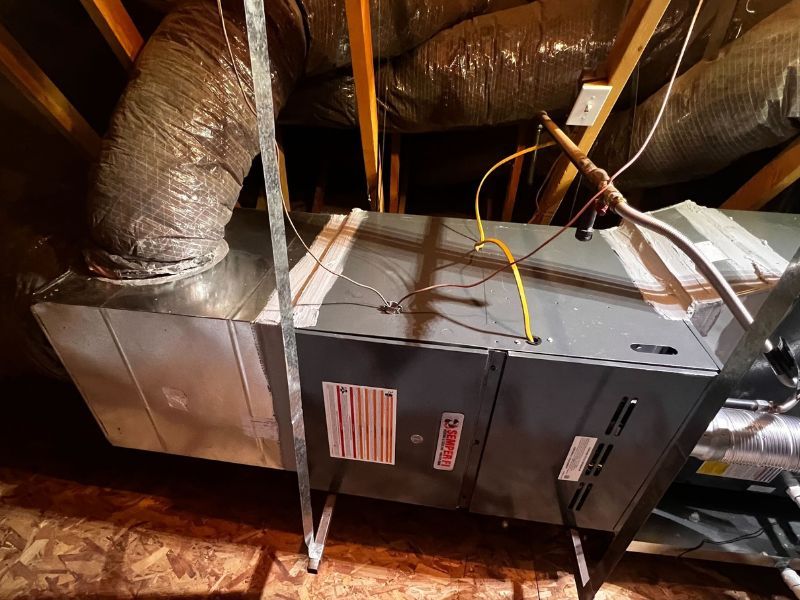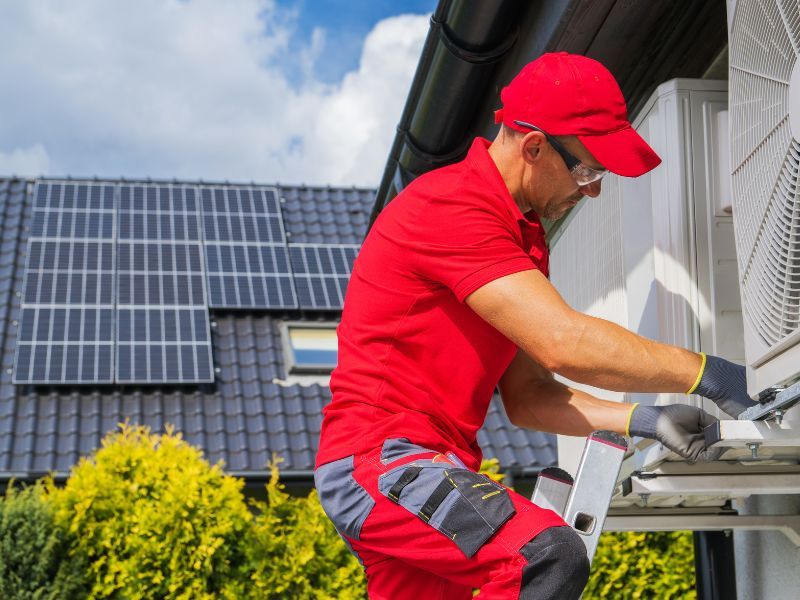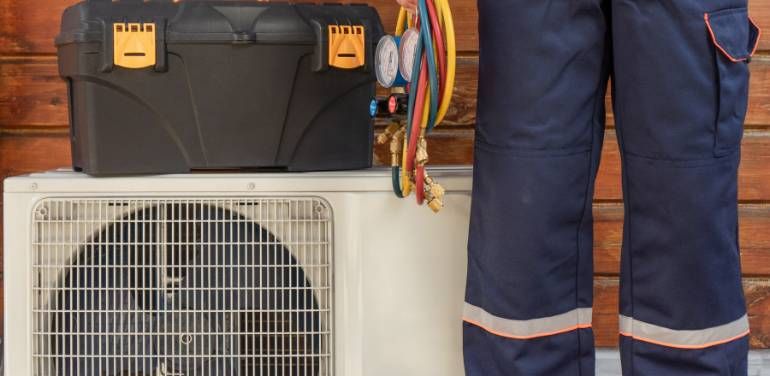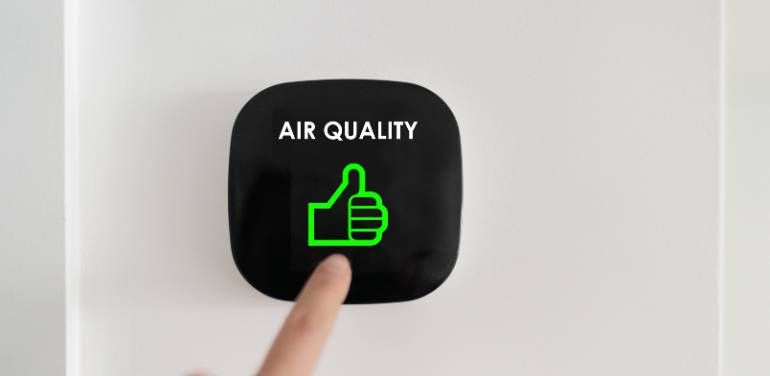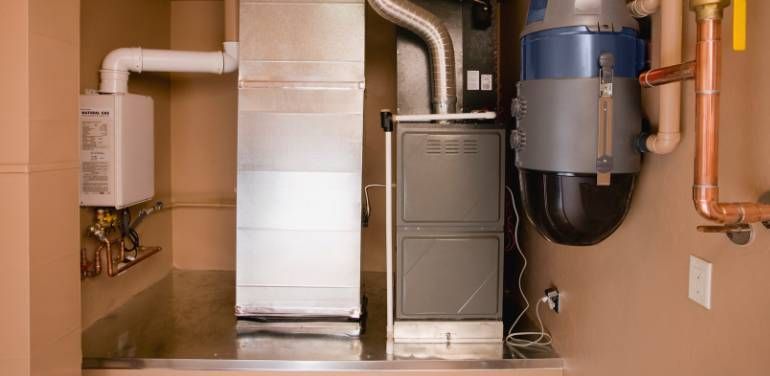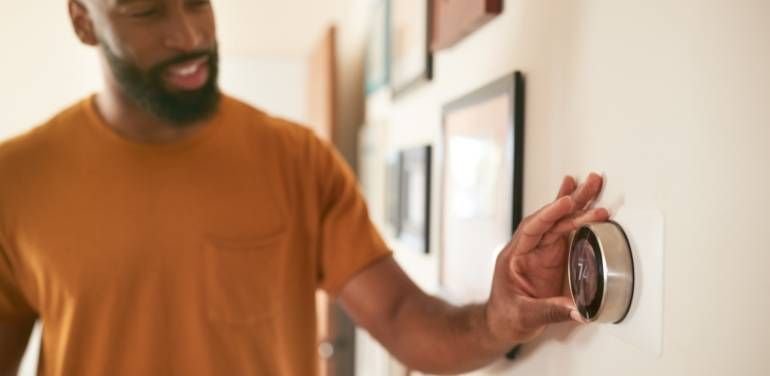What is a Capacitor and Why Do They Break on Air Conditioners?
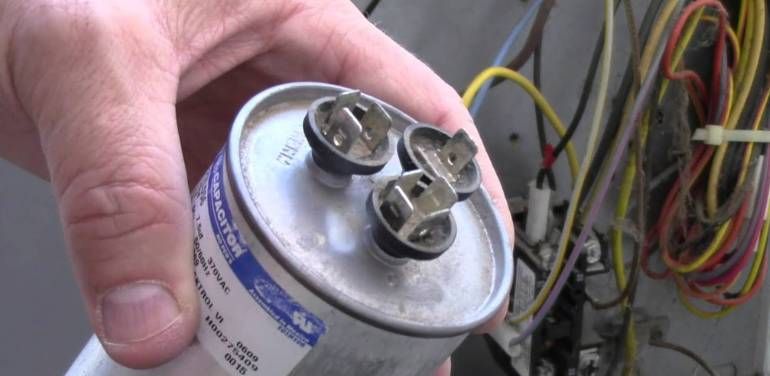
No matter which air conditioner brand you may own, an ac capacitor is the most common part that fails. The worst part, is that most capacitors fail during the hottest or coldest time of the year, and the reason is not just a coincidence.
The following HVAC Guide will answer the following questions about air conditioner and heat pump capacitor’s…
- What is a capacitor?
- Why do capacitor’s fail?
- What happens when a capacitor fails?
- Bad AC capacitor symptoms.
- How much does a new capacitor cost?
- How often should I replace my capacitor?
- Can a homeowner DIY a capacitor replacement?
What is a AC Capacitor?
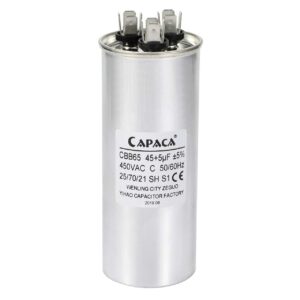
An ac capacitor is a small cylindrical, oval or square shaped device inside your heat pump or air conditioner that supplies or stores energy. When your AC unit or Heat Pump turns on the capacitor’s job is to provide a bolt of electricity (between 300-600 volts) to either start or run the compressor, fan motor, or blower motor.
Air Conditioner Capacitors
There are two types of capacitors inside most air conditioner and heat pump systems, a run capacitor and a start capacitor. They both serve different purposes in your ac. Some ac units have one, some have both and some even combine them into one.
Start Capacitor
Start Capacitor: to provide an initial bolt of electricity to get the compressor or fan motor to start working. After the motor is spinning or cycling the start capacitor is not needed.
Run Capacitor
Run Capacitor: After the compressor and fan blade is started, the run capacitor takes over. The run capacitor is to provide extra power for extended periods of time.
Why do AC Capacitors Fail?
Capacitor’s are a component of your air conditioner or heat pump system, eventually they will wear out and need replacement. The most common reason for air conditioner capacitor failure is overheating. Upon a visual examination the ac capacitor will be swollen and can even burst from the pressure, which is from overheating. This is a dead give away you have a bad capacitor.
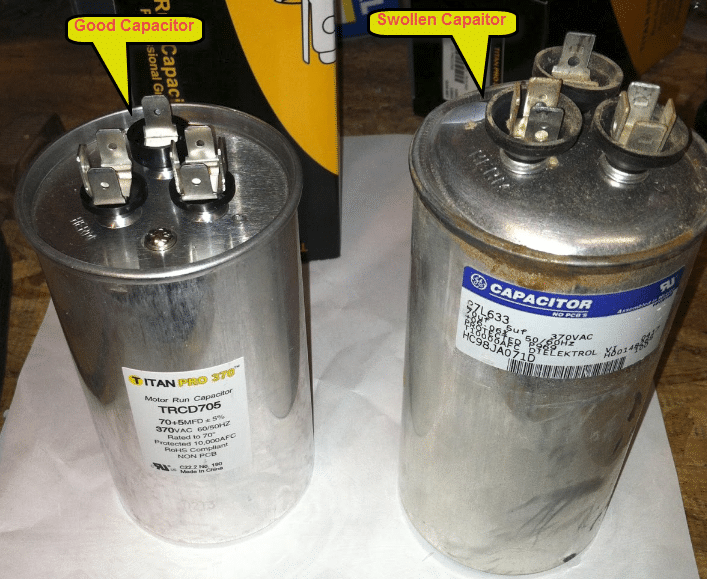
Here are a few reasons why an ac capacitor can overheat.
- Extended or Abnormal Run-Time: heat wave, or an improperly charged refrigerant level in your ac unit.
- Compressor Age: Just like when people get older, a compressor requires more energy to get going as they age. This can overwork a capacitor and can be predictor of a compressor failure coming soon.
- Lightning or Power Surge: Spikes or fluctuations in the power grid, which often time come from lightning strikes can cause major havoc to a capacitor.
- Capacitor Age: The quality of capacitors manufactured these days just isn’t what it used to be. Average life expectancy of a capacitor is only 8-12 years.
What Happens When a Capacitor Fails?
When a failure of a heat pump or air conditioner capacitor does happen, the first sign is that your home will be hotter or cooler than the temperature set by your thermostat. You may even notice that the fan is running but the air coming out of the vents is not cool.
If this happens, first check your breaker panel to see if a breaker has tripped, then take a walk outside to your condenser and see if it running. Pay particular attention to the fan blade, and if they are spinning. If not chances are its a capacitor.
An AC condenser will produce two different sounds when operating normally. You will hear the air of the fan blade, as well as the compressor. If your fan blades are spinning but the unit sounds much quieter than normal, the compressor capacitor may be the culprit.
When a capacitor fails you will experience a breakdown of your heating or cooling system. Since a capacitor operates with over 300 volts, My HVAC Price recommends calling a local certified HVAC repair company.
Tips on how to choose the right HVAC Company, we wrote a guide to help you!
Bad AC Capacitor Symptoms
Here is a list of the type of symptoms you may face if your capacitor is going bad.
- In your breaker panel the air conditioning unit breaker has tripped.
- The fan on the condensing unit is not spinning.
- Your ac unit is very hot, this is due to the fan motor not running.
- Interment services, your air conditioner starts and stops often.
- The old capacitor is swollen or does not match the voltage rating.
- Your home is hot, or there is a problem when your air conditioner starts.
How Much Does a New Capacitor Cost?
The price of a capacitor (part only) for your air conditioning system or heat pump system can range between $9-$60 depending on the required specifications. These prices are just for the capacitor part, and does not include any labor or additional parts that a repair guy or HVAC technician would need to install.
On an average service call a company will arrive, perform a diagnosis on your system, replace the capacitor or parts inside the condensing unit (may have to run to supply store to get parts), then let the system run for a while to ensure it was just the capacitor which failed. A failed fan motor or compressor can cause a capacitor to fail, the symptoms that you experience first is a bad capacitor.
This entire job can take anywhere between 1-3 hours. Prices can alter by your zip code and depending on whether the HVAC tech has the right type of capacitor or any other required parts on his truck.
The average all in price to replace an air conditioner or heat pump capacitor is between $280-$500.
This may seem very extreme to a homeowner when you can find the same part online for just a few bucks, but having a technician trace if the capacitor failed on its own or as the result of an aging compressor is vital.
It may not be wise to replace a capacitor in a system whose compressor is about to fail, the capacitor can simply be the canary in the coal mine indicating a larger problem. A professional HVAC tech can help you navigate this process.
How Often Should I Replace my Capacitor?
Capacitor’s in an air conditioner or heat pump can last up to 20 years, but the average life expectancy of a air conditioner capacitor is around 10 years.
If your system is over 10 years old and you have not replaced the capacitor it is wise to do this proactively to avoid any problems. That way you will not have to deal with an outage, and as stated above most outages happen at the hottest or coolest times of the year.
One of the benefits to an on-going HVAC maintenance contract is for a technician can monitor the components and symptoms of a capacitor every year and look for changes.
Most of the time since the tech is already at your home, the cost to replace a capacitor is much less. The added benefit of piece of mind is well worth it in my book.
Read our guide about HVAC maintenance to help homeowners understand the value.
Can a Homeowner DIY a Capacitor?
Capacitor replacement in your air conditioner should always be done by a certified HVAC or Electrical contractor. This type of problem is not something that a homeowner should attempt to repair. Now, if you are a homeowner with those skills you can certainly handle the job, but if not DO NOT DIY.
Capacitors can deliver well over 400 volts and an improperly installed capacitor or type of part can lead to an electrical fire in your home. At no time does My HVAC Price encourage any homeowner to DIY a air conditioner capacitor.
Want MY HVAC Price to answer your questions? Drop us an email!
HVAC System Cost & HVAC Reviews
More Homeowner Guides
Categories
